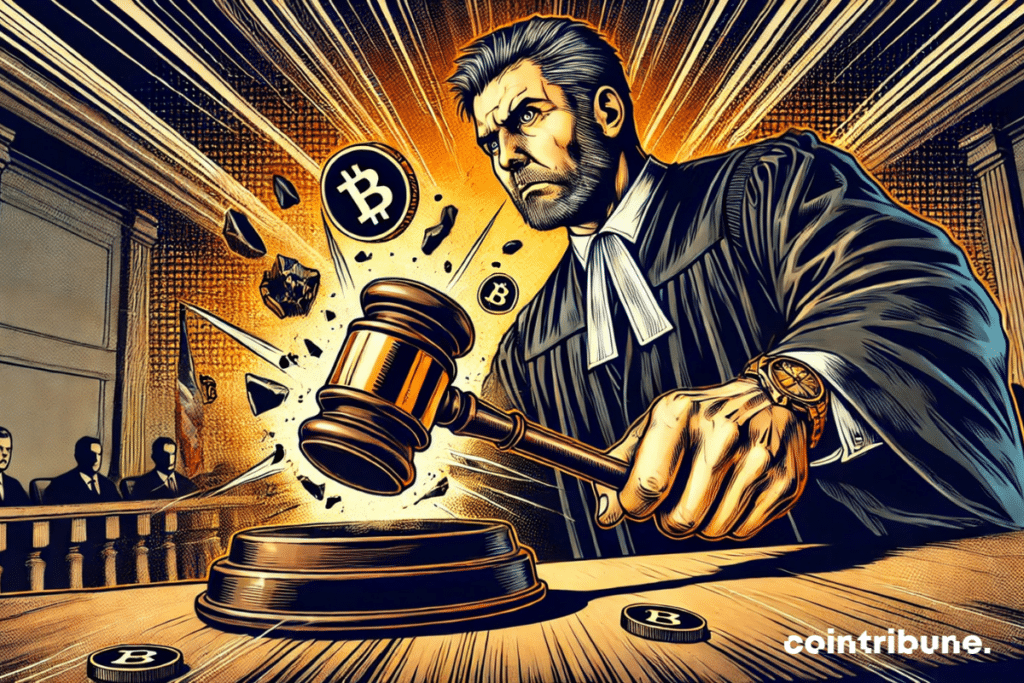Tue January 14, 2025 ▪
6
min read ▪ by
Cryptos have been operating in a regulatory gray area for years, but the latest decision from the US Supreme Court marks a watershed moment for Binance. By rejecting the platform’s request, the highest American court confirms that securities laws apply to transactions carried out on its servers, even if the company does not have a physical headquarters in the United States. This decision paves the way for a class action lawsuit initiated by investors, accusing Binance of selling unregistered cryptos. Already under pressure after a series of lawsuits and a multibillion-dollar settlement with the Justice Department, the exchange and its former CEO, Changpeng Zhao, are facing increased legal challenges. This setback raises a key question: is the United States imposing its authority over the entire global crypto market?


A legal decision with major consequences
On January 13, the US Supreme Court rejected a request from Binance to challenge a lower court ruling. The latter had determined that American securities laws applied to transactions carried out on the platform, on the grounds that they were finalized on servers located in the United States. Thus, even if Binance does not have a physical headquarters on American soil, the courts consider that its activities fall within the financial regulatory framework of the United States due to the location of certain technical infrastructures.
This case dates back to April 2020, when Chase Williams, an investor, filed a lawsuit accusing Binance of selling unregistered financial securities. According to him, the platform would have allowed the purchase of tokens considered as securities without respecting the legal obligations imposed by the American authorities. In March 2023, a federal court validated the continuation of this class action, finding that the American jurisdiction had jurisdiction due to the location of the transactions. Disputing this interpretation, Binance appealed to the Supreme Court, arguing that the rise of new technologies allowed investors to access foreign platforms without being subject to local laws. This argument, however, did not convince the judges, who refused to examine the case, thus paving the way for the continuation of proceedings against the stock exchange.
Major implications for Binance and the crypto industry
With this Supreme Court decision, Binance finds itself facing a new legal front in the United States, adding to a series of ongoing litigation. Since 2023, the platform has been under the surveillance of American regulators, notably the Securities and Exchange Commission (SEC), which accuses it and its former CEO Changpeng Zhao of offering illegal financial services to American investors. This regulatory pressure came to a head last November when Binance reached a settlement with the Department of Justice (DOJ). Thus, the exchange agreed to pay $4.3 billion to settle lawsuits related to violations of laws against money laundering and terrorist financing.
Binance’s legal problems extend beyond the United States. In April 2023, the platform was targeted by a class action lawsuit in Canada, which accused it of similar securities regulatory violations. Additionally, the FTX bankruptcy estate has filed lawsuits against Binance and Changpeng Zhao, seeking $1.8 billion over a controversial stock sale in 2021. This case comes against the backdrop of the collapse of FTX, which has led to legal and financial tensions within the crypto ecosystem. .
Beyond the direct repercussions for Binance, this affair could redefine the regulatory framework for crypto exchanges operating internationally. By validating the application of American laws to foreign platforms, the Supreme Court opens the way to increased control by financial authorities over offshore companies. The move could encourage other regulators to adopt a similar approach, thereby complicating market participants’ compliance strategies. If Binance fails to contain these legal attacks, other exchanges may be forced to quickly adapt their operations to avoid the same fate.
As the cryptocurrency industry calls for clearer regulation, the Supreme Court’s decision marks a decisive turning point in the fight between American authorities and large exchange platforms. By validating the application of securities laws to transactions carried out on Binance, American justice opens the door to increased control of foreign exchanges operating in the United States. This precedent could encourage other regulators to adopt similar measures, increasing pressure on the entire sector. It remains to be seen whether Binance will manage to contain the impact of this class action, or whether this decision will trigger a wave of harsher sanctions that could reshape the rules of the game for the global crypto ecosystem.
Maximize your Cointribune experience with our “Read to Earn” program! For every article you read, earn points and access exclusive rewards. Sign up now and start enjoying benefits.
A graduate of Sciences Po Toulouse and holder of a blockchain consultant certification issued by Alyra, I joined the Cointribune adventure in 2019. Convinced of the potential of blockchain to transform many sectors of the economy, I took the commitment to raise awareness and inform the general public about this constantly evolving ecosystem. My goal is to enable everyone to better understand blockchain and seize the opportunities it offers. I strive every day to provide an objective analysis of current events, to decipher market trends, to relay the latest technological innovations and to put into perspective the economic and societal issues of this ongoing revolution.
DISCLAIMER
The views, thoughts and opinions expressed in this article belong solely to the author and should not be considered investment advice. Do your own research before making any investment decisions.




